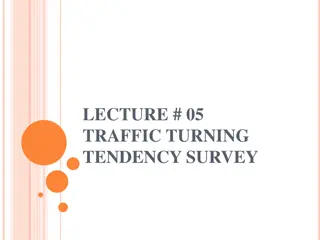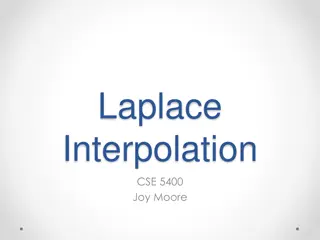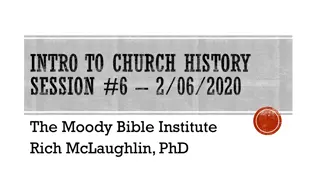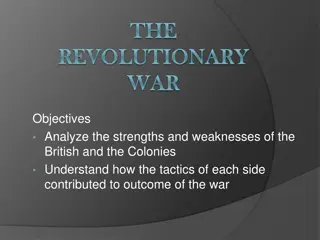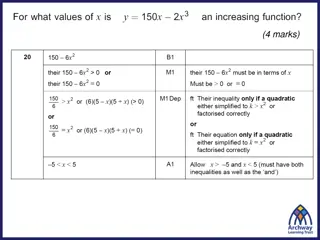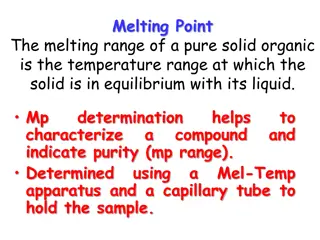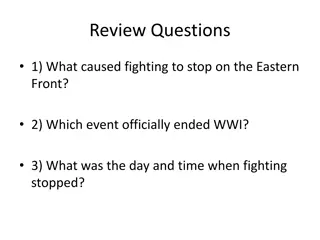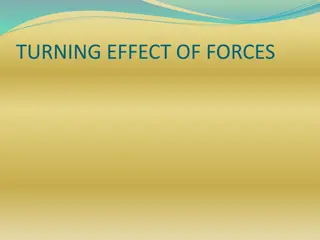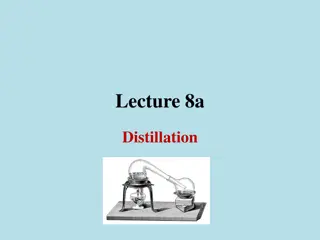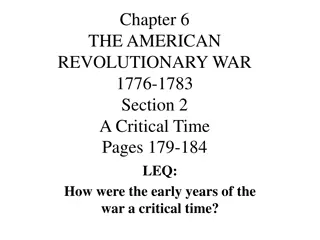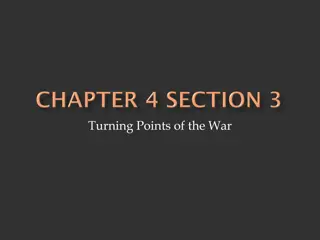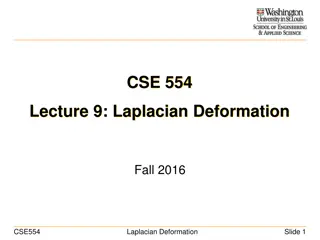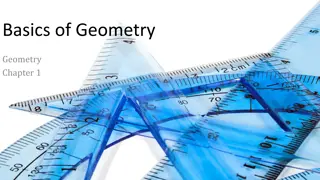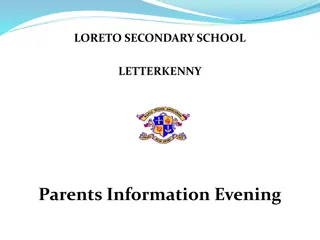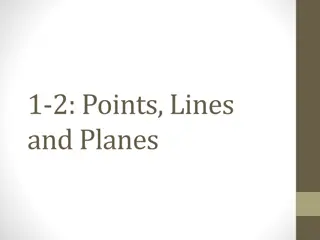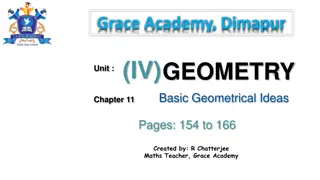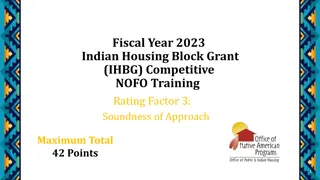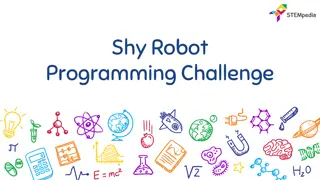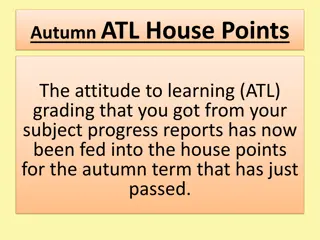Exploring Continuity and Change in History Education
Understanding history involves recognizing both continuity and change over time. This exploration delves into how students develop historical thinking skills, identify key turning points, and grasp the significance of events in shaping the past. From foundational concepts to higher levels of analysi
0 views • 59 slides
Understanding Traffic Turning Tendency Surveys in Transportation Studies
Transportation surveys are crucial for gathering data on traffic movements and factors influencing them. Traffic turning tendency, traffic counts, and flow characteristics help planners assess road efficiency and safety. Monitoring traffic volumes and patterns aids in optimizing road infrastructure
0 views • 16 slides
Understanding Laplace Interpolation for Sparse Data Restoration
Laplace Interpolation is a method used in CSE 5400 by Joy Moore for interpolating sparse data points. It involves concepts such as the mean value property, handling boundary conditions, and using the A-times method. The process replaces missing data points with a designated value and approximates in
1 views • 13 slides
The Transformation of Hitler: From Nobody to Somebody
Explore the events that shaped Adolf Hitler's rise from obscurity to power, including his early life, experiences in World War I, and the societal conditions that influenced his path. Delve into insights from historians like Richard Evans, Ian Kershaw, and William L. Shirer to understand the key tur
0 views • 10 slides
Understanding Mortgage Points: Calculate, Compare, Decide
Explore the world of mortgage points by learning how to calculate discount points, determine breakeven time, and evaluate if buying points is a wise decision. Through examples, understand how purchasing points can affect your interest rate and overall cost, helping you make informed decisions when f
0 views • 17 slides
Visualizing Real Numbers on a Number Line
The procedure of representing real numbers on a number line through successive magnification is explained in detail. It involves dividing the line, marking points, and magnifying specific intervals to accurately position numbers like 5.2316. Each real number corresponds to a unique point on the numb
0 views • 12 slides
Unveiling Historical Turning Points in God's Kingdom
History in church resembles a swinging pendulum, with significant "turning points" marking key moments. Uncover foundational and united tasks in God's kingdom through this enlightening session by Dr. Rich McLaughlin at The Moody Bible Institute.
0 views • 49 slides
Strengths and Weaknesses in the Revolutionary War
The Revolutionary War between the British and Colonies showcased distinct strengths and weaknesses on both sides. The British struggled with unconventional warfare tactics and failed to win over the hearts of the colonists, while the Patriots benefited from strong leadership, support systems, and ci
0 views • 9 slides
Understanding Rotations on the Coordinate Plane
Rotations on the coordinate plane involve turning points either clockwise or counterclockwise around the origin. Different rotations like 90, 180, 270, and 360 degrees have specific rules and effects on the coordinates. It's important to know how to symbolically represent rotations and understand th
1 views • 8 slides
Understanding Points of Inflection in Calculus
Points of inflection in calculus refer to points where the curve changes from convex to concave or vice versa. These points are identified by observing changes in the curve's concavity, and they are not always stationary points. A stationary point can be a point of inflection, but not all points of
0 views • 14 slides
Understanding Melting Points in Organic Chemistry
Melting points play a crucial role in identifying compounds and assessing their purity. The melting range of a pure solid organic compound indicates its equilibrium temperature with its liquid form. Impurities can lower the melting point, causing depression and broadening of the melting range. Mixed
9 views • 13 slides
Turning the Tide on Privatised ECE in New Zealand - ICMEC Seminar Highlights
Linda Mitchell's seminar on turning the tide on privatised early childhood education in New Zealand delves into the importance of valuing ECE as a public good and a community of learning that empowers both adults and children. The presentation covers key aspects such as ECE policy reforms, impacts o
0 views • 21 slides
Woodrow Wilson's 14 Points and the End of WWI
Woodrow Wilson's 14 Points were a series of peace proposals aimed at ending World War I and establishing lasting peace. These points included measures such as ending secret treaties, ensuring freedom of the seas, and promoting self-determination. Wilson's efforts were recognized with the Nobel Peace
3 views • 10 slides
Why More Job Seekers Are Turning to Recruitment Agencies in Canada
One of the primary reasons job campaigners are turning to recruitment agency in Canada is the access they give to retired job requests. numerous job openings are n\u2019t announced intimately and are filled through internal referrals or exclusive rec
0 views • 7 slides
Aircraft Banking and Turning Techniques Overview
Aircraft banking and turning involve rolling the aircraft to a predetermined angle of bank while maintaining performance and balance for level, climbing, or descending flight to achieve a predetermined heading. The primary methods for banking include using ailerons to turn the airplane, rudder to ba
1 views • 19 slides
Understanding U.S. History: Founding Documents, Founding Fathers, and Major Eras
Explore the significance of the Declaration of Independence, U.S. Constitution, and Bill of Rights, along with the contributions of notable Founding Fathers. Delve into applying founding principles to historical events and identifying major characteristics and eras in U.S. history, from 1877 to the
0 views • 115 slides
Understanding the Turning Effect of Forces
The turning effect of forces is explained through the concept of moments, where the moment of a force is calculated as the product of the force and the perpendicular distance from the pivot point. This principle is essential in understanding how forces can cause objects to rotate or turn. Explore ex
0 views • 26 slides
Understanding Distillation: Methods and Factors Affecting Boiling Points
Distillation is a process used to separate liquids based on their boiling points, with methods like simple, fractional, vacuum, and steam distillation. The boiling point of a compound is influenced by factors such as molecular weight and functional groups, where higher weights and polar groups lead
1 views • 15 slides
Understanding Distillation: Boiling Points and Factors
Distillation is a process of vaporizing and condensing liquids to separate components based on boiling points. This method utilizes differences in boiling points of liquid mixtures to achieve separation. Factors influencing boiling points include molecular weight, functional groups, and intermolecul
0 views • 16 slides
Outlook for 2020: Business Cycle Impact on Election Predictions
Professor Steven Kyle from Cornell University discusses the challenge of predicting turning points in the business cycle and its impact on election outcomes. With mixed outlooks on GDP growth, unemployment rates, inflation, and interest rates, the uncertainty of a potential economic slowdown looms o
1 views • 48 slides
Residence Returning Scheme Points Allocation Guidelines
This document outlines the points allocation guidelines for the Residence Returning Scheme, covering categories such as Academic Excellence, University Contributions, Hall-Based Contributions, and Discipline Deduction. It provides detailed criteria for scoring in each category, including GPA points
0 views • 21 slides
Why UK Companies are Turning to Executive Search Firms for Leadership Talent
\nUK companies are increasingly turning to executive search firms to secure top leadership talent. In this article, we explore why specialized firms like Alliance Recruitment Agency are essential for finding the right leaders. From accessing a larger
1 views • 5 slides
The American Revolutionary War 1776-1783: A Critical Time
In this chapter, we delve into the early years of the American Revolutionary War from 1776 to 1783, exploring the pivotal battles and turning points that shaped the conflict. Key figures, important events like the Battle of Saratoga, and the assistance received from foreign nations are highlighted.
0 views • 25 slides
Turning Points of the American Revolutionary War
The American Revolutionary War saw key turning points including battles like Trenton and Saratoga, harsh winters at Valley Forge, and the final victory at Yorktown. Factors contributing to the Patriots' win were British underestimation, political nature of the conflict misunderstanding, high Patriot
0 views • 9 slides
Laplacian Deformation in Engineering and Applied Science
Laplacian deformation is a technique used in non-rigid registration to account for shape variance and improve fitting between source and target shapes. This method involves minimizing the distance and distortion terms to achieve accurate alignment. Intrinsic and extrinsic methods are discussed, wher
0 views • 53 slides
Interactive Points-based White Board Review for Social Studies Unit 2
Engage in a points-based review session using images to guess answers related to historical terms such as "Mission," "Abandon," "Treaty," and more. Earn points for correct answers and lose points for incorrect ones as you cover topics like settlements, exploration causes, and historical events.
0 views • 19 slides
Understanding the Physics of Yellow Change Interval at ITE International Convention
Delve into the intricate details of the physics behind the yellow change interval at the ITE International Convention. Explore the critical points, braking points, comfortable stopping distances, and the concept of unimpeded through movements. Learn about the equation for turning vehicles decelerati
0 views • 14 slides
Basics of Geometry: Understanding Points, Lines, and Planes
Explore the fundamental concepts of geometry in this slideshow developed to accompany the textbook "Big Ideas Geometry." Learn about points, lines, and planes, their characteristics, how they are named, and their relationships in space. Gain a clear understanding of line segments, rays, collinear po
0 views • 55 slides
Understanding Convex Hulls in Computational Geometry
Convex hulls play a vital role in computational geometry, enabling shape approximation, collision avoidance in robotics, and finding smallest enclosing boxes for point sets. The convex hull problem involves computing the smallest convex polygon containing a set of points, with extreme points determi
0 views • 119 slides
Loreto Secondary School Parents Information Evening Summary
Loreto Secondary School in Letterkenny conducted a Parents Information Evening covering important topics such as the points system, CAO, HEAR/DARE, UCAS, Leaving Certificate points, grades, bonus points for Mathematics, and matriculation requirements for various institutes. The presentation outlined
0 views • 64 slides
Overview of Turning Maps into Ballots Process for Michigan Elections
Learn about the process of turning maps into ballots for Michigan elections, including tasks, timelines, and the role of the Bureau of Elections and the Qualified Voter File (QVF). Understand how the Michigan Independent Citizens Redistricting Commission completes districts for State House, Senate,
0 views • 7 slides
Introduction to Points, Lines, and Planes in Geometry
Exploring the fundamental concepts of points, lines, and planes in geometry, including definitions, examples, and postulates. Learn about collinear points, coplanar points, segments, rays, and key postulates in geometry.
0 views • 18 slides
Largest Red-Blue Separating Rectangles Study
This study explores the problem of finding the largest area axis-aligned B-empty rectangle containing n red points and m blue points. The research discusses various extensions to the original problem, such as the Blue Rectangles problem and the Outliers Problem, aiming to achieve efficient solutions
0 views • 20 slides
Understanding Basic Geometrical Ideas in Geometry
Basic Geometrical Ideas in Geometry cover the fundamental concepts of points, lines, and planes. Points are described as having location but no size, lines are infinite sets of points, and collinearity is discussed. The importance of straightness in lines is assumed but not defined. Symbols and nota
0 views • 45 slides
Indian Housing Block Grant 2023 Competitive Priorities
The Fiscal Year 2023 Indian Housing Block Grant (IHBG) Competitive NOFO Training focuses on Soundness of Approach with a maximum of 42 points. Subfactor 3.1 emphasizes IHBG Competitive Priorities, including new housing construction projects, housing rehabilitation projects, acquisition of units, and
0 views • 23 slides
Understanding Boiling Points and Intermolecular Forces
Exploring the relationship between intermolecular forces and boiling points, this content discusses trends and anomalies in boiling points of halogens, isomers with the same molecular formula, molecules with similar Mr, and polar molecules. It explains how molecular size, structure, and interactions
0 views • 5 slides
Shy Robot Programming Challenge: Logic-Based Autonomous Robot
The Shy Robot is an autonomous robot equipped with two IR sensors to avoid obstacles. Its behavior is determined by a logical control system - moving backward if both sensors detect an object, turning right if only the left sensor detects an object, turning left if only the right sensor detects an o
0 views • 5 slides
Autumn ATL House Points Distribution for School Year Groups
The attitude to learning (ATL) grading from subject progress reports has been incorporated into house points for the autumn term. Students receive points based on their ATL grades, with opportunities for additional points. The top-scoring houses are awarded points accordingly for each year group. Th
0 views • 13 slides
Exploration of Words: Turning, Beliefs, and Communication
Delve into the roots and meanings of words related to turning, changing beliefs, and communication. Discover terms like "convert," "extrovert," "invert," and more, unlocking insights into different aspects of human behavior and language.
0 views • 29 slides
Enhancing OpenStreetMap with Crowdsourced Turning Restrictions
Abundance of GPS tracking data has led to significant research on map-matching algorithms and identifying turning restrictions. This study focuses on inferring turning restrictions for OpenStreetMap data by utilizing historic map-matching results effectively. Understanding and implementing turning r
0 views • 25 slides

